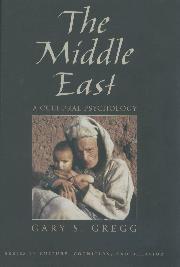
Contents
Introduction 3
Part
I:
Cultural Context of Development
1 Misunderstandings 13
2 Social Ecology of Psychological
Development 44
3 Honor and Islam: Shaping Emotions,
Traits and Selves 90
Part
II
Periods of Psychological Development
Introduction to Part II 136
4 Childbirth
and Infant Care 153
5 Early Childhood 179
6 Late Childhood 212
7 Adolescence 252
8 Early Adulthood and Identity 288
9 Mature Adulthood 325
10 Patterns and Lives:
Development Through the Life-Span
359
Afterword: A Research Agenda 369
Notes 379
References 421
Index 451
Pre-Publication Reviews
"This
original and timely book explores the life trajectories of men and women
in the Middle East and North Africa from a psychocultural point of view.
Based on the author's fieldwork in Morocco and his broad knowledge of
the pertinent psychological and social scientific literature in Arabic,
English, and French, this volume will prove indispensable for anyone attempting
to understand how Middle Easterners and North Africans are trying to cope
with the struggle between the old and the new in their respective societies
and their daily lives."
--Uwe P. Gielen, Professor of Psychology, St. Francis College, Brooklyn,
New York
"At a time when stereotypes of societies
and people in the Muslim Middle East and North Africa, including "the
Arab mind," circulate in the American press and in popular culture
and when even esteemed scholars promote theories of a clash of civilizations,
Gary Gregg introduces a much needed antidote, in his book on cultural
psychology in the Middle East and North Africa. Drawing on the dynamic
theories of Erik Erikson, Bea and John Whiting, and Robert LeVine, Gregg
contributes a superb work that combines a much needed focus on the Middle
East with a wide cultural psychology framework that gives weight to emotion
as well as cognition and that acknowledges the richness of ethnographies
and life histories accessing subjective experience as well as the measurement
of psychological attitudes."
--Mary-Jo DelVecchio Good, Professor of Social Medicine and member
of the Center for Middle Eastern Studies and the Weatherhead Center for
International Affairs, Harvard University
"Gary
Gregg has written a bold and fascinating, yet admirably disciplined and
thorough, book about a topic on which we all need more knowledge. This
book provides a compelling portrait, accessible to any reader, of dominant
themes in the culture and experience of individuals in the Middle East
while also attempting to reform the way we think about the relationship
of individuals to their cultures. Gregg explodes existing myths and stereotypes
of Middle Easterners and introduces us to ethnographic accounts of their
lives, relationships, goals and identities. Deftly synthesizing a massive
literature, as well as drawing on his own intensive research in Morocco,
Gregg is frank about the limitations of the evidence and critical of unsupported
generalizations. He is a reliable guide to a hot and controversial terrain.
I found the book illuminating and full of surprises, and I recommend it
to anyone seeking a deeper understanding of the Middle Easterners than
is available from journalistic sources."
--Robert A. LeVine, Roy E. Larsen Professor of Education and Human
Development, Emeritus Harvard University
"Gregg
has provided an engaging, thoughtful, and wide-ranging discussion that
should be read by students and scholars interested in the very important
cultural transformations taking place in the Near and Middle East."
--Fathali Moghaddam, Professor of Psychology, Georgetown University